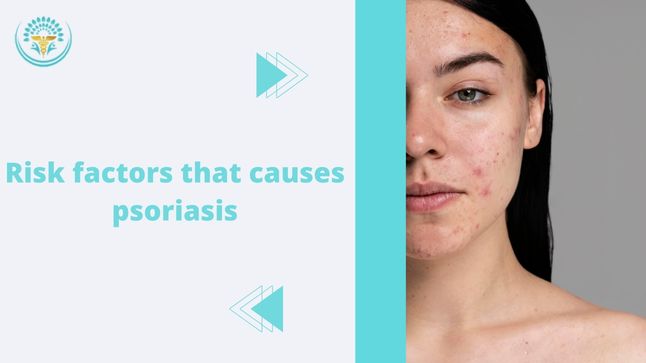Risk Factors That Causes Psoriasis
Risk Factors That Causes Psoriasis
Psoriasis is an autoimmune condition that leads to inflamed and scaly skin due to the rapid production of new skin cells. Normally, skin cells regenerate every month, but in individuals with psoriasis, this process occurs within days, causing red, itchy, and scaly patches.
Understanding the Risk Factors That Causes Psoriasis is essential, as multiple triggers can contribute to its onset. While research is ongoing to determine the exact cause, around 10% of people inherit genes that may lead to psoriasis, but only 2-3% actually develop it. Genetic predisposition, environmental triggers, stress, and immune system dysfunction all play a role in the condition.
This suggests that a combination of genetic factors and environmental triggers plays a role. At Provitale Health, we offer the best homeopathic treatment for psoriasis, targeting both the root cause and symptoms to provide lasting relief.
Risk factors
Some people who are susceptible to psoriasis are practically free of symptoms for years together until the disease is triggered by some factors. Common psoriasis triggers include:
-
Weather, especially cold, dry conditions
Cold climates worsen psoriatic symptoms, as dryness pulls moisture from the skin, intensifying inflammation.
-
Stress
Although stress doesn’t directly cause psoriasis, it can trigger flare-ups or worsen existing cases.
-
Injury to the skin
Injuries like vaccinations, sunburns, and scratches act as risk contributors, leading to psoriasis outbreaks in affected areas.
-
Infections
In the case of patients with a compromised immune system, like that with AIDS, patients undergoing chemotherapy treatment for cancer, or people with another autoimmune disorder are prone to psoriasis. Patients with recurring infections, especially such as strep throat or upper respiratory infections, are also at an increased risk of worsened psoriasis.
-
Smoking and exposure to smoke
Smokers have nearly twice the likelihood of developing psoriasis. The risk rises with higher cigarette consumption and is notably greater in women.
-
Heavy alcohol consumption
The link between alcohol and psoriasis risk factors is complex, as smoking and drinking often go together. However, studies show that alcohol consumption, particularly in men, worsens psoriasis. Since alcohol is hepato-toxic, it can aggravate psoriasis symptoms.
Alcohol is a total no for patients who are on certain medications used for treating psoriasis.
-
Medications
The use of certain medications is linked to triggering psoriasis. These includes: Lithium, antimalarials, beta-blockers, quinidine and indomethacin. In some cases, these medicines have made psoriasis worse.
- Abrupt withdrawal of oral or injected corticosteroids
Corticosteroids, when used for any treatment should ideally be gradually weaned off, else there are likely chances of psoriasis being triggered.
Anyone can develop psoriasis. One in three psoriases begins in childhood. However, certain factors can multiply your risk of developing the disease and are not modifiable:
Family history. The condition runs in families and sometimes it happens in members of the same family. Though the exact cause of Psoriasis is not known, it is attributed to multiple factors. Since it is seen running in families, genetic predisposition cannot be ruled out.
At Provitale health homoeopathy, the patient’s case history and risk factors are taken in depth to provide you with medicine suiting that particular type of psoriasis which you suffer from.
Conclusion
Causes of psoriasis can be due to multiple factors with immunity-distortion functioning as the primary cause. Psoriasis can be triggered by multiple factors and there are also some risk factors. Once psoriasis is confirmed, homoeopathic treatment is to be initiated as a first choice. At Provitale, you get the best homoeopathy Doctor in Bangalore popular to treat any chronic ailments.

